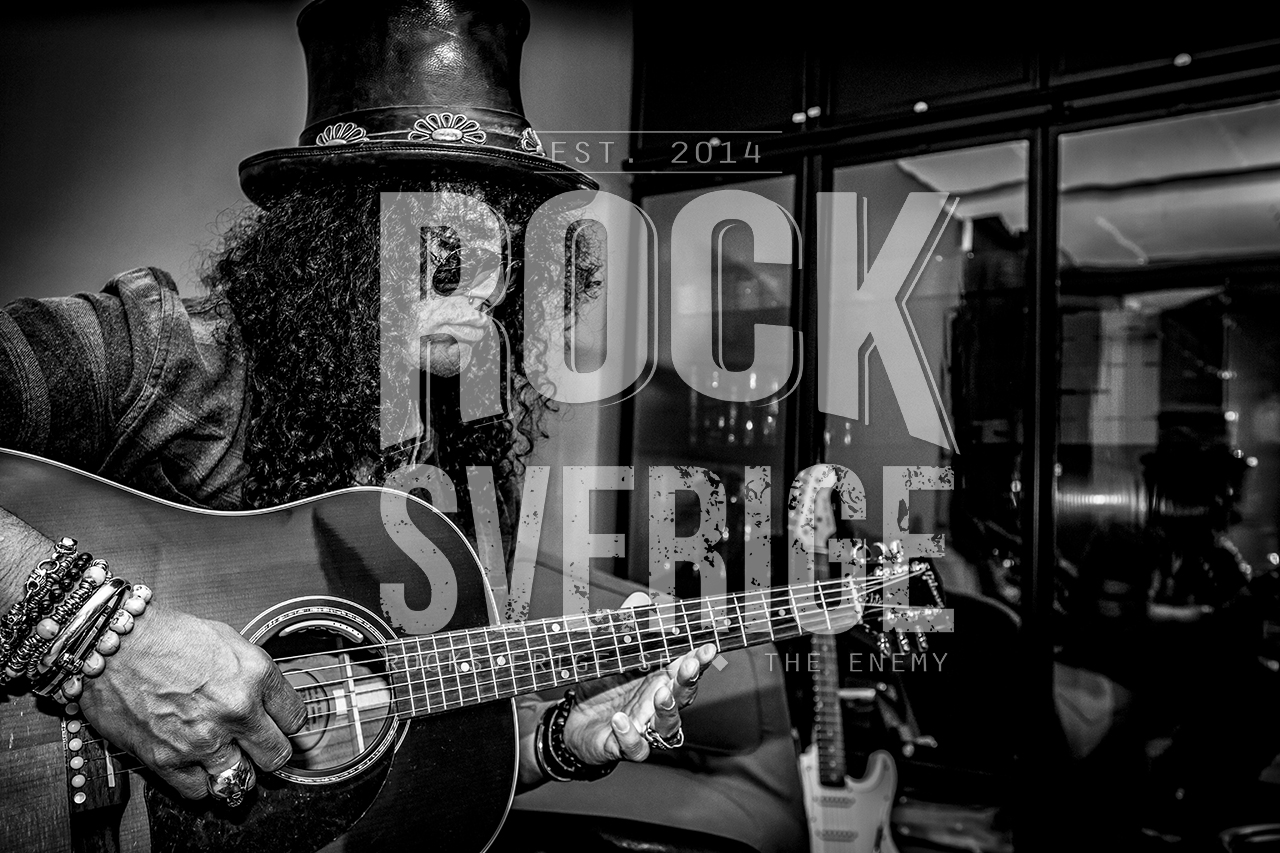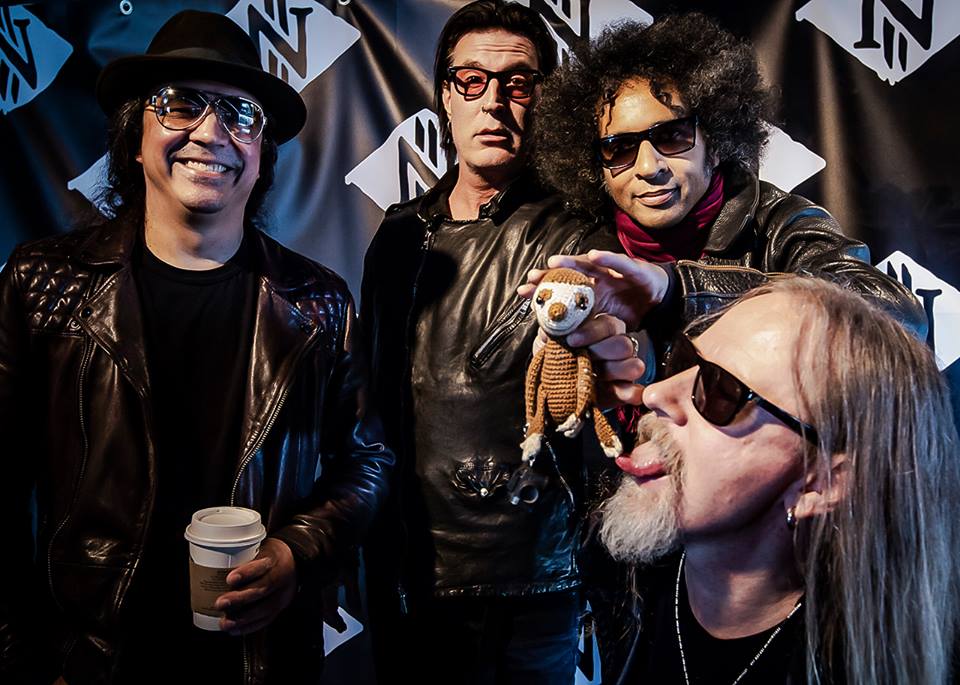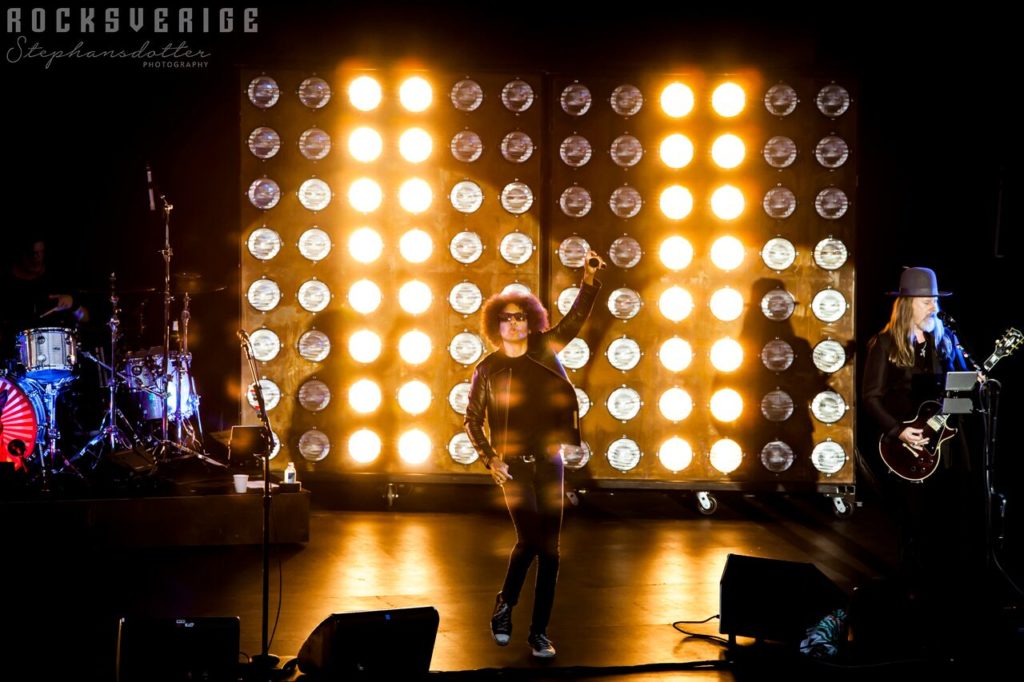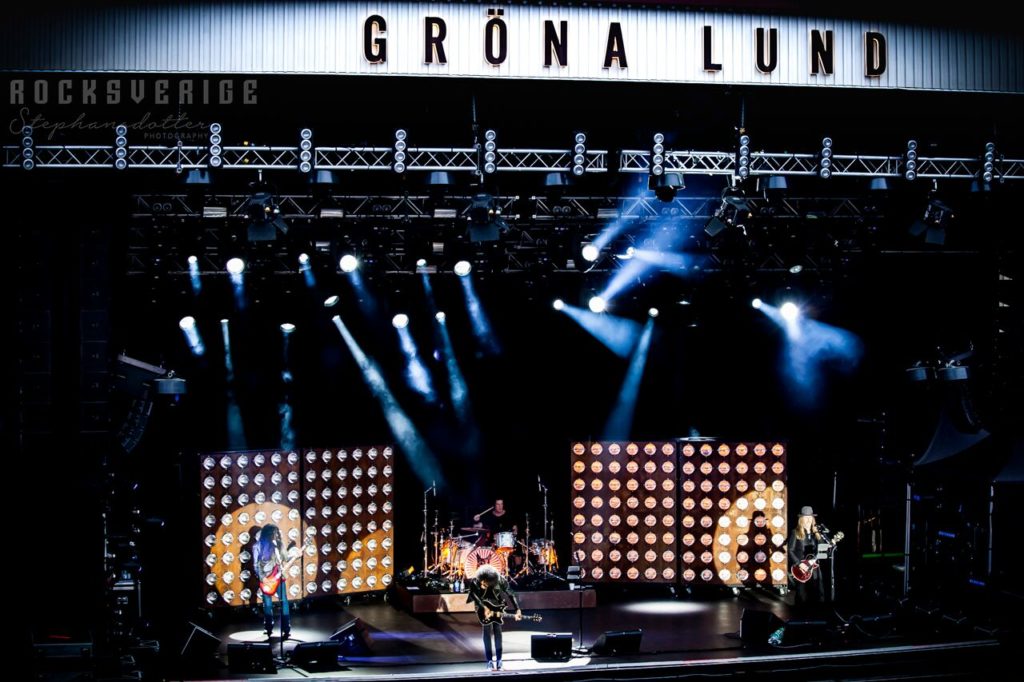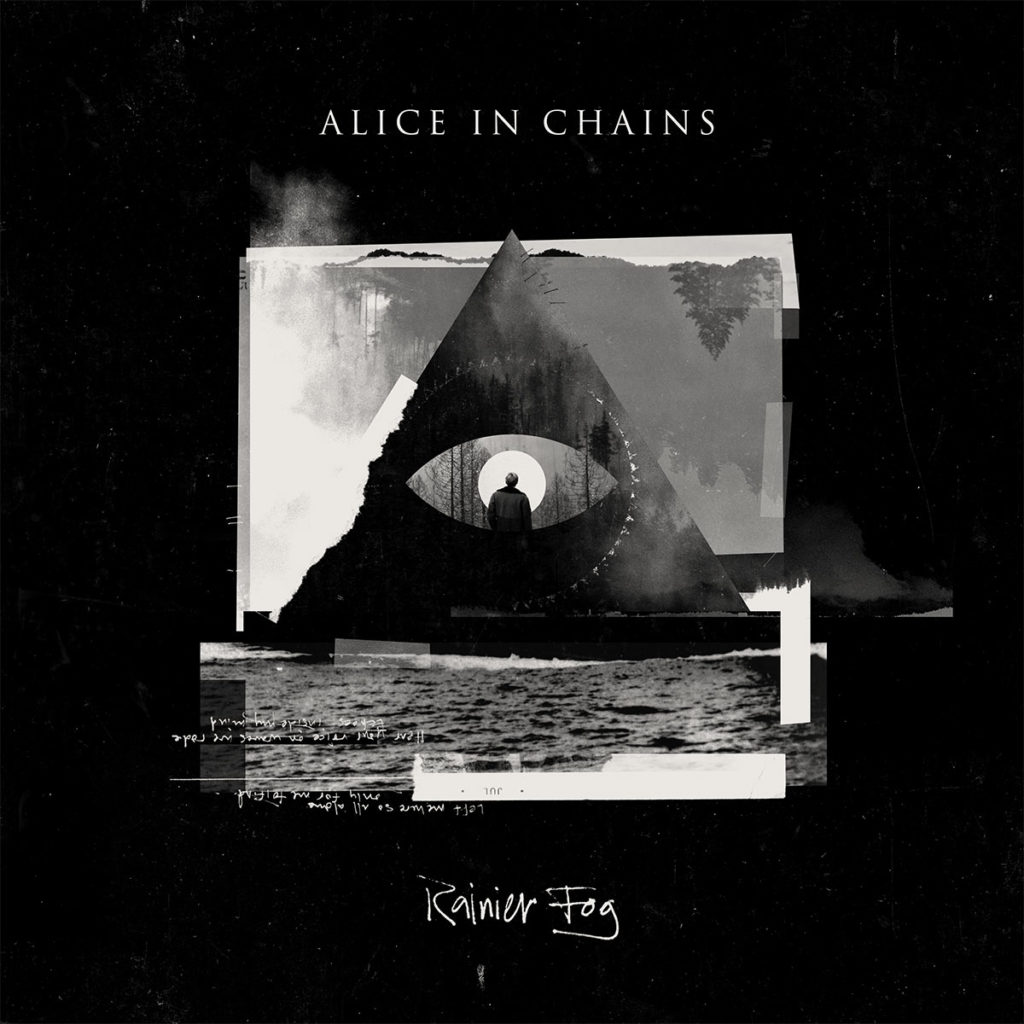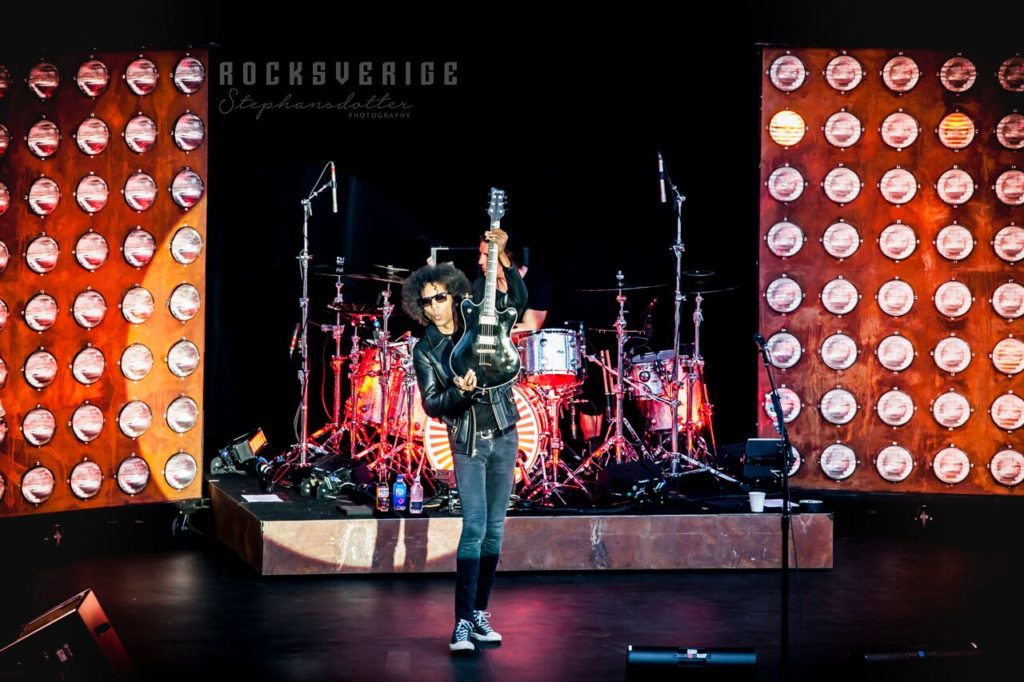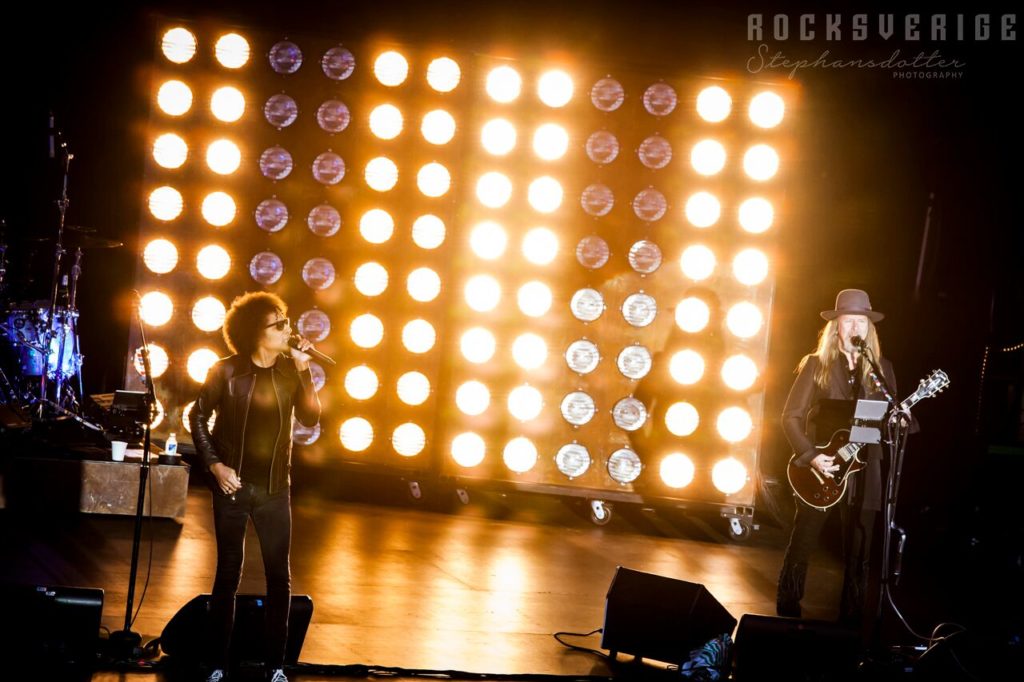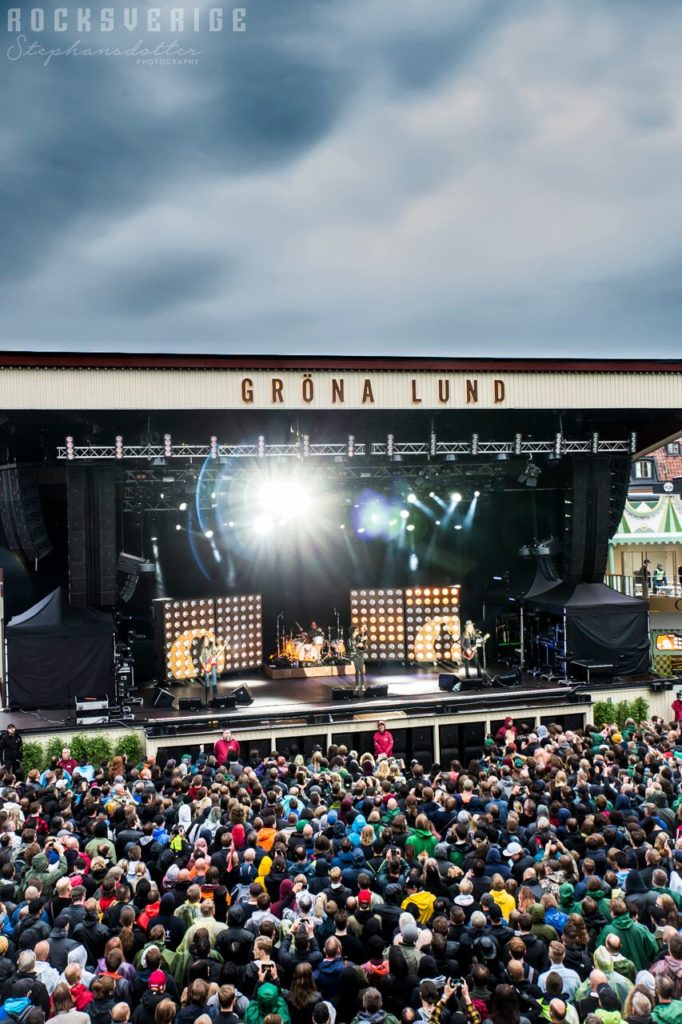Alice In Chains är tillbaka med besked och har levererat ett av årets mest intressanta album, i alla fall om du frågar undertecknad. I samband med spelningen på Gröna Lund tog vi pulsen på William Duvall och Mike Inez och pratade om nya skapelsen “Rainier fog”, men även om hur Jimi Hendrix kom att påverka dem båda som unga och hur Duvall kände inför bandets återkomst och hans “debut” 2009 med “Black gives way to blue”:
“You´re aware of the external pressures but you´re even more acutely aware of the pressures that you´re putting on yourself. I remember that time as being charged with a lot of excitement, but also a lot of tension and sort of… I guess fright would be one way to put it. Apprehension and things like that. But there it is, you know. We made it and we put it out and we toured it and people dug it, so that´s the final say.”
How do you feel the band has evolved since ”Black gives way to blue” (2009) , which is almost ten years old now? How do you feel about the journey so far?
William: I just think it´s been a natural progression and it´s been quite a ride. With time, one just settles into a reality, you settle into a situation and I think now we are seeing the fruits of that longevity, with this album in particular.
Mike: There´s no way to go about, like naturally progressing, like William said. It´s been hundreds and hundreds of gigs now and we´ve been all over the world in every country. You name it, we´ve played it. Every size venue from headlining stadiums and festivals to the smallest clubs to now, the fun park (Gröna Lund). 30 years to get here. (laughs) It´s gigs and gigs and gigs and we´re an old school kind of mentality, there´s no way around it, especially in this age of pro tools and people piecing stuff together and it´s some kind of world now…
William: Using tracks on stage. We don´t do that. Every sound you hear from us is being made by one of the four of us. That´s it.
Mike: We try to keep it as organic as possible. For guys like us, there´s no other way to do that. Especially going back to when you (William) first joined us for those first tours before ”Black gives way to blue”. We were hitting it hard, man. We were playing five times a week and it was almost two years. I´m glad we did that before we did ”Black gives way to blue” because when we got into the studio, we just took that energy into the studio.
William: Yeah, this band found itself on stage.
Mike: Absolutely That´s a great way to put it, right there.
How do you look at that album today. For me, it´s one of my favorite Alice In Chains albums. How do you feel looking back at it?
William: I don´t know. I don´t really spend a lot of time looking back on it. What I remember of the experience is just that it was largely characterized by trying to shut out all of the external noise happening around us about what we were doing and whether we had the right to do it and all that and just trying to do the actual thing. It was a trip. You´re aware of the external pressures but you´re even more acutely aware of the pressures that you´re putting on yourself. I remember that time as being charged with a lot of excitement, but also a lot of tension and sort of… I guess fright would be one way to put it. Apprehension and things like that. But there it is, you know. We made it and we put it out and we toured it and people dug it, so that´s the final say.
Mike: It´s 2018 now and looking back, which we don´t tend to do, really… we´re so busy all the time. We leave here (Stockholm) tonight and we´ve got a nine hour drive to go play tomorrow. The ship´s going forward. Looking back on it now, come to think of it, when we were recording that record, you (William) had a baby and now he´s growing. There´s markers of how far away it was, but as far as our day to day it doesn´t affect us really.
William: Yeah, I had lots of excitement and fear and trepidation on many levels happening at the same time. It was a highly charged atmosphere.
Mike: I remember telling Jerry at the beginning like ”Wow, this is a huge undertaking, ” and he said ”Fucking´A, right!” I never met… and I´ve told William this in private, I´ve never seen anybody just put their chin out there and ”What have you got? Bring it! I´m here, I´m putting my foot on the monitor and I´m gonna sing it.” I´m glad we undertook it.
How do you guys usually work when putting together an album? Do you work in teams or by yourselves?
William: There are things that happen individually and then it´s sort of brought together and then hashed out from there, usually that´s how it works. There might be some teaming up if maybe there are some ideas Cantrell hasn´t finished up or if you get to the group and people have ideas about this or that. It starts individual and then it ends up collective.
Mike: It´s a filtered process. By the time it gets to… I think any band is like this, 80% of your initial riffs are just shit and 20% are good. (laughs) From those then ten coalesces into let´s say the ”Rainier fog” record. We all say at this point, we´ve mixed it and it´s no longer our record to be honest, it´s your record. We´re handing it off to you, ”Here´s the record!” and now it´s not ours anymore. We hope people like it. I was talking to Jerry about this when we were doing an interview yesterday. It´s kind of like almost not our business what you think about it and vice versa. It´s not your business what we think about it. We´re more than happy to share what we think about it, but on that level it´s like a thing and we´re in it together and we´re enjoying it together now. To birth this thing was such an undertaking.
A lot of bands say that. Once you´re done and it´s recorded, you kind of hand it over to the fans and then it´s theirs. Also interesting is that you as a band spend time recording the album, it is a piece of art, you pick the songs in what order they´re gonna come and these days people can change around the songs and play ”shuffle” or whatever. How do you feel about that, since you´ve put a lot of thought into what song follows what song and you end it with this song?
William: Sure, but again it goes back to ”it´s not our business” I mean, even going back to my own childhood, I remember a lot of times I would start a record with side two and that would become my favorite side for a long time and I might not listen to side one for months, or I´d have my favorite song… and even then, with vinyl records, I´d just find the needle and put it where it needs to be in the groove and listen to side two track two and then let it play out. Everybody has a right to get to know the music in whatever way they want, but of course we put these things together to be a certain type of experience and if you want to have that experience, we´ve made it available for you to do that.
Mike: It´s a different world. We´re all old school guys here and all of us too, got into music at a really young age, we´re talking early 70´s when I was listening to my parents records and stuff. It´s like fighting the ocean. You can get up to your waist in the ocean and you can fight the waves all day long, but it´s not gonna stop and you can´t change anything. It´s a digital ocean we´re swimming in now and it´s just the way the world is.
The new album then, ”Rainier fog”? I´m guessing it has to do with Mount Rainier outside of Seattle? I was there in 1994. Beautiful city. Tell me about the album and how far back did you start working on it? Is it about two years?
William: Yeah, probably close to that, a year and a half, two years. We spent most of last year coalescing those ideas and then recording it. I think 2017 was basically from start to finish all about trying to make this record happen. We spent the first few months trying to sort of finalizing demos and things, and that again gets to people working individually and then maybe just starting to come together a little bit and then we spent all summer in Seattle recording.
Mike: Literally in the shadow of Mount Rainier.
William: Right, and in Studio X, which is a studio that has a lot of history, both with this band and other bands that we love. We spent the entire summer there and then in the fall we sort of… Cantrell and I sort of decamped to rural Tennesse where Nick Raskulinecz (producer) has his studio. We went from being right in the middle of downtown Seattle to then suddenly being in Tennesse in this bucolic community with nothing but farmland for miles around and did most of the finishing of the record there. Then, as we always do, we ended up going to LA to do the final work at Henson, which is where we did ”Black gives way to blue” and ”The devil put dinosaurs here” (2013).
Mike: We were in the room where The Police did ”Zenyatta Mondatta” (1980) and Tom Petty did stuff there and The Carpenters.
William: Yeah, Henson goes back to Charlie Chaplin. He was the one that built that place in 1917. It was the Chaplin Studios and then it was A&M Studios for a long time and now it´s Henson and there´s a big Kermit the frog. ”We are the world” (1985) was done there. All kinds of stuff.
Mike: It was nice to go back to Seattle, to go back to the Seattle part of that. I have this kind of anxiety… me and Cantrell are flying up and we live in Los Angeles now and we were flying up to Seattle and we had done the ”Dog” (1995) record in this actual studio and we were in a lot different shape back then. Going up there I had this kind of palpitation and anxiety. I thought I was gonna see ghosts at every corner. Just memories of that time, but I quickly found out walking into the studio that it was just like ”Ok, plug into this amp. It´s gonna be fine.” We just put our nose to the grindstone. I learned a lot about myself at that moment, ”Ok, cool. We´re not those guys in 1994 anymore. We´re doing some cool stuff in 2017.”, you know.
William: And if anything, it seems like all of that stuff, all that history and the knowledge of that history, if anything, it fuelled what was happening in 2017. It didn´t hinder it. It actually inspired a lot of things and helped spurr things forward in a really nice way. I know for me, for one, the song ”Never fade” was written right in that studio in the backroom. We had the main controlroom where we recorded and then we had this smaller room in the back where you could just go and work on ideas. We had a little recording set up there as well and you could demo things and even track things if you wanted, while people were working in the front. I went back there one night after everybody had gone home and I just stayed there all night. I was thinking about a lot of things. I had just lost my grandmother on New Year´s Day…
Mike: And Chris (Cornell, 1964-2017) was on the cover of every magazine on every corner. A lot of stuff going on.
William: Yeah, so January 1st I lost my grandmother, so I was thinking about that…
Mike: God bless her. She raised a good boy.
William: Yes, she did raise me and she lived to be a 105 years old. It was really the end of an era in my life and our family´s history. I had just lost her and I was processing that and then obviously Chris Cornell was just a horrific loss, so I was just sitting there kind of thinking about all of that and thinking about many other things and that song just chanelled. I feel like… I don´t know if that song could have been written anywhere else but Seattle and specifically in that room in that building and in that studio. There was something that was necessary about all of it.
Mike: A historic building. ”Superunknown” (1994), Steve Miller´s ”Fly like an eagle” (1976), Pearl Jam´s ”Vs” (1993), Alice In Chain´s ”Dog” record, Heart´s ”Bad animals” (1987). Amazing music and we´re those kinda guys, once again, we´re old school and we´re not going there cocky, we respect this stuff. I could just see The Police working shit out in that studio or Soundgarden in this room.
William: You´re in the kitchen having a band meeting and you´re thinking like ”Wow, imagine all the band meetings that have take place right here where we´re sitting.” There was a lot of beauty in that and also just being in that city during that season. Summertime is the most beautiful time of year in Seattle and living downtown, I would walk to work every day. I had this apartment on the top floor of this beautiful building there and I walked to the studio from there. I would walk to work every day and just encounter really nice people along the way. I even got stopped by a policeman in the middle of the street. I was crossing the street and a policeman walks up to me and the first thing I´m thinking is ”Oh lord, what´s about to go down here?” and for good reason, you know. It turns out… ”Oh, William, I saw you at the so and so and you played here like three years ago. What are you doing in town? Are you working? Are you making a record?” The thing is, all traffic stopped. There´s a cop in the middle of the street talking to me. (laughs) Maybe they were waiting for an arrest to go down? (laughs) Instead it was this wonderful moment. The whole summer was characterized by things like that. You meet people in the restaurant, you meet people in the coffee shop or whatever and it was really a cool time.
Mike: There´s something in the water up there. It´s a magical city. I think it was geographically isolated too, so back in the day during the 80´s these bands were like smoking weed in the basements in the rain and there was nothing else to do, while everybody else is in LA mixing and matching and giving just random people record deals for millions of dollars. People that couldn´t really play their instruments. In the meantime these bands were up in Seattle really jelling and kind of marinating their sound and discovering their identity. That´s what I love about that town. Soundgarden doesn´t sound like Alice In Chains, doesn´t sound like Pearl Jam, doesn´t sound like Nirvana, doesn´t sound like Mudhoney, doesn´t sound like Screaming Trees. They all have their own identity and that would be my big thing for young bands out there – Discover your own identity, wear your own clothes, do your thing and that´s the freedom of it. That´s what you do to score, that´s the big payoff I think.
I´ve picked a few songs and thought we´d talk about them a bit. If we start with the title track ”Rainier fog”?
Mike: Good riff, good energy. The album title isn´t about that actual mountain per se. It´s just more of a feeling of that. You know that feeling because you´ve been up there (Seattle). It´s just a really special, magical place. It´s kind of like when you looked at the Led Zeppelin ”IV” album cover or ”Houses of the holy”, it´s that feeling but this other world or place. It´s kind of timeless. It could be in the past, it could be now… just a vibe of it and we wanted to kind of share that with the world. It´s not about the mountain per se.
William: I think it´s suggesting some old ghosts too. How does one live with the memories of these things while you´re still moving forward?
Mike: A lot of valcanoes are blowing up all over the world right now. When Mount Rainier blows that whole area is gonna be gone.
William: Let´s enjoy it while we can. (laughs)
Another track I really fell in love with instantly is ”Maybe” Tell me about that track?
William: A little Eagles and Doobie Brothers. It´s cool and it´s a similar thing. Luckily this group can kind of run the gamut of different sounds within the rock idiom and this group´s always been a big harmony band and that song just kind of showcases that and we´d thought it´d be fun to just go ahead and start with that. We haven´t done that before, where something starts like acapella… I was about to say Acapulco. (laughs)
Mike: That should be the next record.
William: That´s a nice riff layered number there. It´s cool.
Mike: It´s a ride of an album. I didn´t even realize it. When I finally got home and we got the mixes, it just a ride it takes you on. A lot of peaks and valleys. A lot of texture. I just wanna give a quick shout out to our mixer Joe Barresi (Tool, QOTSA, The Melvins). It was our first time working with him and that was just a great learning experience. He has this knack of bridging old gear and old technology with the new technology, which is a trickier thing than you would think. Having the machines talk to each other from like the 60´s to now. He has so many different things and just watching the guy work… he took us in a different direction as far as like the other two records, especially the ”The devil put dinosaurs here” record is just pummeling and big riffs. It´s huge and he scaled it back and made it more musical by going small and then making that big. I think that´s a big difference.
William: This band definitely has a lot of ”more is more” going on in terms of overdubs. It was good to be able to sort of say ”Maybe we don´t need 42? Maybe we can make do with 24?” Joe is sort of a producer and a mixer and he´s a producer in his own right as well as a mixer. He´s an engineer, he´s a producer… he´s got a lot of knowledge that he brings of the entire process. When he´s just mixing, like on our record, he still brings a wealth of knowledge to that and it´s very helpful and of course this is the third record we did with Nick as producer, so there was a great familiarity there. By the time you get to album three, everyone really knows everybody else´s tricks and quirks and personality defects.
Mike: What guitars work and even knowing amps and knowing how they´re gonna react.
William: He always knew that, but even on a personal level, like now you really know each other and now you can really get real and now the debates can sort of have the gloves off, in a way that they didn´t before and I think that serves the process well. It´s like ”Ok, we know what battles we´re gonna have to fight even before we get into them.”
Mike: You play something and think you nailed it and then you look at him and he gives you that one look and you go ”Ah, that wasn´t it? Fuck man! Goddammit!”
William: Again, he always did that, but now there´s just this level of familiarity, for better of for worse, but mostly for the better. I think that level of honesty and that level of knowing one another serve us well. It served this record well for sure.
He´s got tons of stuff, right? I talked to Halestrom about that recently.
William: Between him and us it´s a guitar store or music store. What´s really cool as a guitar player is that we can really make use of the whole… using a battery of amps to get one tone. You set up four or five amps, you´ve got them all running, you´re recording all of them, but you´re mixing them as you go to create one sound. One amp can maybe handle more of the low end, two amps can maybe handle different type of mids and some other amps can maybe handle more of the high end. It´s a lot of fun and you learn a lot. I think everybody learns a lot in that situation. Even those of us who´ve have made a lot of records and even those of us that have done this a ton of times. You learn every time you go in, because you never know how the gear´s gonna react or how the mics are gonna react and you can set up and experiment and you think it´s gonna go one way and it goes another way and that unexpected turn can be the thing that makes it. The level of surprise is always there and especially if you let it be there.
Mike: It´s interesting, Nick went down to the Waterfront there in Seattle and he found this guy selling these little cigar amps, little tiny speaker in there and instantly as he walked into the studio I knew it was gonna end up on a song. I should´ve bought one as well.
William: There are a few songs. That was a great find. That little cigar box had this really narrow, nasal kind of midrange thing and when you layered it on a track with all these heavy amps going and two of these monster speaker cabinets… you layered that little cigar box in there and suddenly the riff takes on a whole other… there´s a clarity and it´s one of those things… you wouldn´t necessarily notice it and pick it out and go ”Oh, is that a cigar box amp?” if you listened to the whole track, but if you pull it out you´d go ”Oh, wait! Where´s the definition?” Suddenly the track just went to hell. Great find and that´s a good example of what we´re talking about.
Working with Nick again, is it kind of like a ”if it isn´t broken, why fix it” thing?
William: We spoke to a couple of other people and ended up going with Nick. Probably for most of the reason you just said.
Mike: He´s one of our brothers in life. We love Nick and he´s a family member at this point.
William: Yeah, and there´s this thing about a trilogy too and there´s a nice symmetry to that.
The first single ”The one you know”, I really like that one and the video too. It´s heavy and dark. What´s the story behind that one?
William: You´ve got this Alfred Hitchcock/Psycho riff and the lyrics are basically saying things are not what they may seem. For the visual, we´re kind of teaming up with this film maker. He´s actually making a film, we´ve made a record and we decided ”Well, perhaps we could bridge our two mediums together and see what we can do?” The video for ”The one you know” is sort of the first chapter of what we´re hoping will be visuals for all ten songs on the album and in addition to that, will be a companion piece to this film this fellow is now in process to continuing to shoot.
Mike: An Australian guy called Adam Mason.
William: We´ll see how it all turns out, but it could be a really nice marriage and maybe even a harbinger of further things to come.
Crazy times in the US and the world. Is there anything about that, lyric wise, that you touch upon on the album?
William: Absolutely, but it´s one of those things too…
Mike: It´s not our business how you translate it.
William: The beautiful thing about art and particularly songwriting is just that. You can be overt with your feelings about certain things, particular issues…
Mike: There are certainly a lot to write about.
William: There is… or you can be a bit more sort of nuanced about it and subtle in terms of how you express it. Maybe not in terms of your actual feelings, but in terms of how you translate it and what words you choose and what visuals you choose and what sounds you choose and then, again, you allow everyone else, the listener, to bring to it whatever they´re bringing to it. It can become sort of a mirror for every person that chooses to look in its direction. So yeah, obviously the events of the last five years between ”The devil put dinosaurs here” album and this new one ”Rainier fog” album have informed every aspect of all the songs. There are a lot of things that have been happening in our personal lives and things happening in the world that find their way in there and they would no matter what, that´s just how it is. That is part of being an artist and being a songwriter and being a musician.
Mike: And that´s why we take time off between records and tours because you have to live life to write about life. Otherwise we´re just writing songs about catering and… we don´t wanna write grumpy old guy road songs and about the flight being cancelled. (laughs) You have to step away, go out and just live life and be with family. Do life and then write about it.
How do you find tour life these days?
William: It doesn´t get easier. (laughs)
Mike: But they´re not gonna come to us, so we gotta go to them. (laughs)
William: It´s not getting easier, but there are moments and I have to say today is sort of seeming like one of those moments where you run into these unexpected surprises. You come to a city like Stockholm, that I love, and we´re doing this gig in this amusement park and it´s a setting your just not expecting and the venue has this history I wasn´t expecting. Then there´s combining that unexpected thing with the things you come to know and love, like ”Oh, the people are so nice! And ”Oh, I just had this salmon that melted in my mouth.” and ”Look at these buildings!” and ”Look at these people! Everyone´s beautiful.” That makes the other things about touring so much more bearable.
Mike: Everybody thinks it´s Friday night and a summer night in Paris every night. Usually you´re in the middle of winter in Topeka, Kansas and you´re playing a cold arena and you´ve got the flu and you still have to go and play one and a half hours or whatever. But it´s what we do and we love it. We´re just getting our sealegs now. We did the whole east coast of the US up into Canada playing with our friends Stone Temple Pilots, Tool and doing these really cool shows and a lot of headlining shows. This is our first jaunt into Europe again and this is our third show. We´re going to 17 countries and we end in Tel Aviv, I think. Then we take a break and then do the west coast of the US and then South America is coming up. You can´t think in terms of that, you just have to get out of Sweden with all your fingers and toes. (laughs)
Jimi Hendrix played here (Gröna Lund) and they actually pulled the plug on him because he went pass curfew.
William: (laughs) He wanted to jam.
Going back when you guys started out and got into music, what are your memories of the first music you heard that really had an impact on you?
William: It was Hendrix for me. I always had certain songs on the radio that I liked, even when you´re three or four or five years old, you respond to music in a very pure way, but the first music where I wanted to know how that was being made and being done… ”What are these sounds and how is he doing that? Is that a guitar? What´s he doing? Feedback, what is that? Marshall stacks, what is that? Stratocaster, what is that?”, it was Hendrix. My cousin is ten years older than me and he moved in with my mother and me and he brought his records with him and one was ”Band of Gypsys” (1970). That was the one that did it and I was just bombarding him with questions all the time. The album he brought was this warped vinyl and scratchy and the cover had long since gone missing so I didn´t know what Hendrix looked like. I didn´t know anything. I only knew I was hearing these insane sounds coming out and I felt the spiritual power of it and it was just ”What is that noise? What is he doing?” and my cousin going ”That´s a guitar too. He´s probably down on the floor.” and he was trying to explain it to me and there were no visuals. We didn´t have the internet and this stuff wasn´t on television. This was in ´76 so there was nothing. He goes to the library and gets these old copies of Rolling Stone magazine and xeroxes them and brings them home and I was like ”Oh my God, he looks like us!” and that was it. ”This is what I´m doing!” I started playing guitar and I was playing this horrible acoustic that I found in my grandmother´s basement. Then my cousin joined the Navy in ´77 and with his first paycheck… he was like ”Ok, I´m gonna get you a Fender. You can have a either a used Stratocaster or you can have brand new 1977 Fender Mustang.” and I was like ”I want the brand new!”, so he got me my first electric.
Mike: For me it was probably Hendrix too early on. Stuff like Earth Wind and Fire and just everything, you know. Elton John was big for me. I was like one of those guys, ”What´s a Hendrix? What´s a Black Sabbath? What´s a Deep Purple? Holy shit, what´s a Thin Lizzy?” and then off you go and you just run with it. Music is a good noble vocation. It´s harder and harder for bands to break through and I can´t stress that enough, just keep fucking plugging in and jam. Like Dave Grohl says ”Just go and suck with your friends for a while and then Nirvana happens.” It´s so important, especially in this fucked up day and age. Art and losing yourself in grooves with your friends and making art is so important more than ever. I know around Stockholm there is a lot of art, a lot of bands. The Swedes are just amazing. I still listen to that band AB/CD. Mike (Micke Hujanen) is coming tonight. I´ve known him for 35 years. And Mobile Homes, all of that stuff. I just fell in love with this country.
I remember you William, posting from the studio of you playing ”On fire” with Van Halen.
William: Yeah! I came out with this guitar, the Framus Talisman that I designed. Just a beautiful instrument and the amplifier that I designed with George Metropolis, a super amazing amp builder in Detroit, Michigan. I was in sonic heaven after testing out these production models and I just wanted to post that as a little thing. I mean, Van Halen, what can you say? The first six records are just a benchmark of guitar tone. I wanted to show ”Hey man, you want the brown sound? I´ve got your brown sound. I´m actually brown so you get the real brown sound!” (laughs)
Text: Niclas Müller-Hansen
Foto: Therés Stephansdotter Björk
